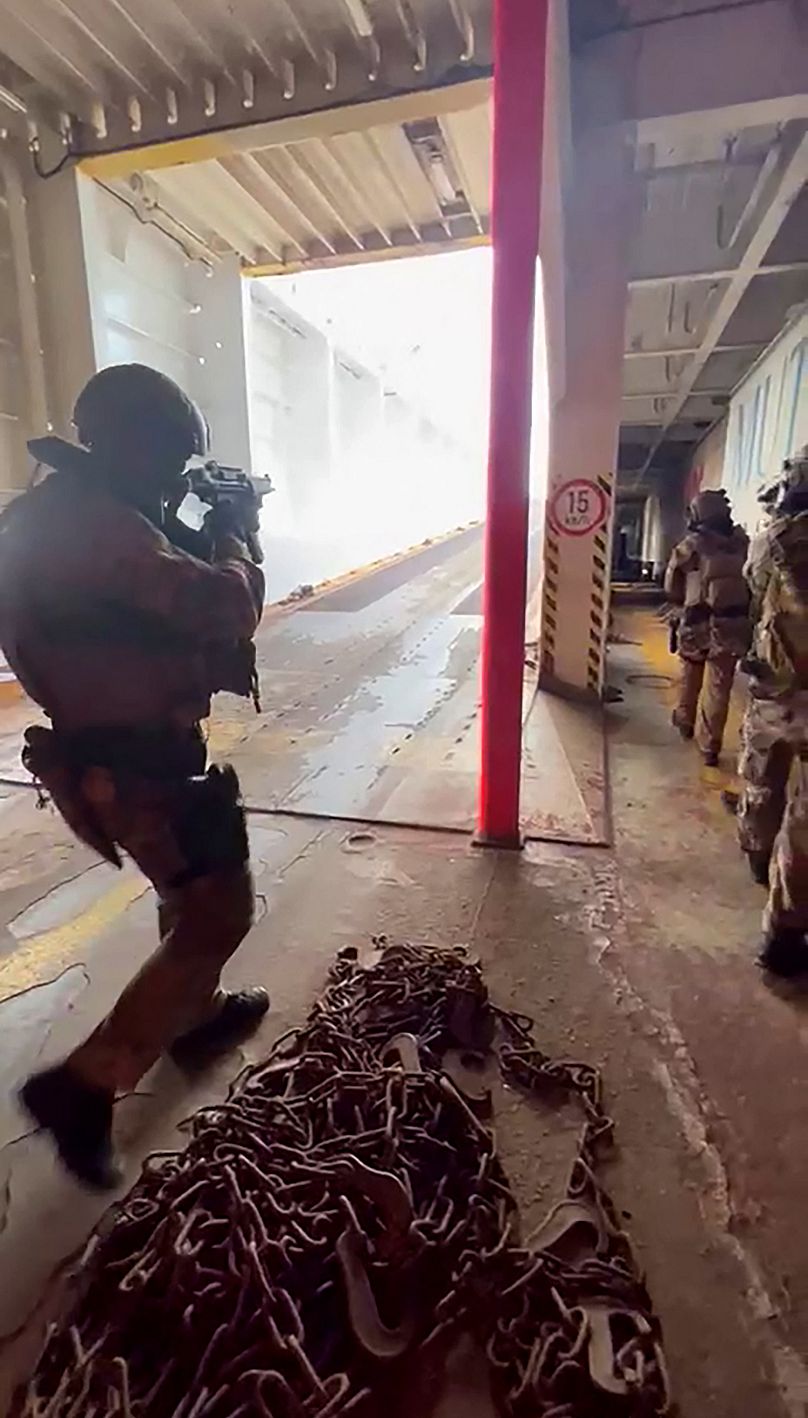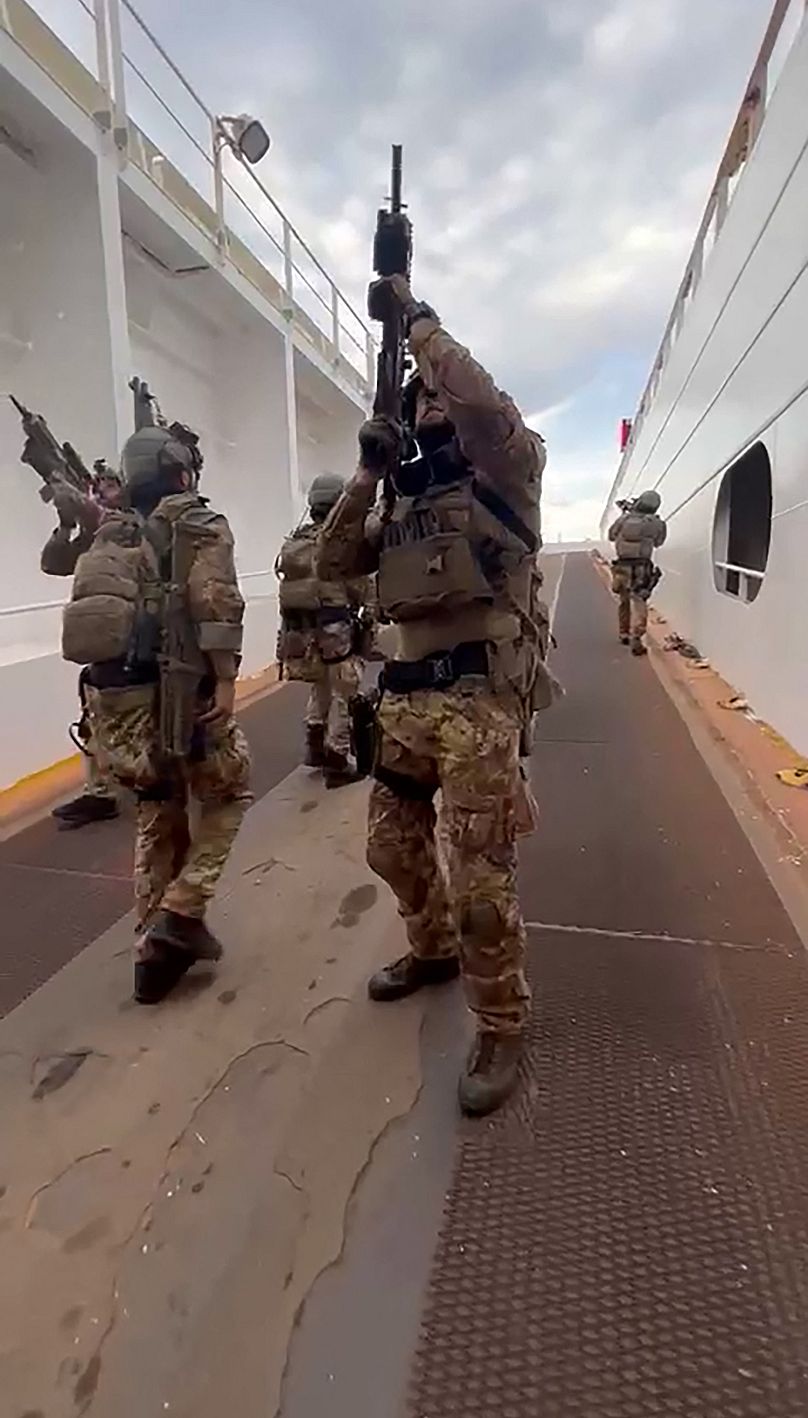Last weekend, Italy's defence minister said that the country's special forces were rescuing a cargo ship hijacked by armed pirates. The reality was something quite different.
Three military ships, two helicopters and dozens of special forces units were deployed by Italy last weekend to rescue a Turkish vessel off the coast of Naples which Italian media reported had been hijacked by “pirates.”
 ADVERTISEMENT
ADVERTISEMENT
 ADVERTISEMENT
ADVERTISEMENT
According to the news reported by many of the country’s biggest newspapers, like Repubblica, Libero, and La Stampa, a group of 15 armed “pirates” had claimed control of the cargo ship headed to France on Saturday, taking the vessel’s crew hostage after being discovered on board.
But the sensational headlines turned out to be partially misleading. So where did media outlets get their information from?
Although there was no official press release from authorities about the incident at the time, Italy's Minister of Defence Guido Crosetto had made a comment saying there had been a blitz by Italian special forces to rescue a Turkish cargo ship hijacked by pirates armed with daggers.
According to the minister, the captain of the Galatea Seaways, had managed to radio Ankara for help, and the Turkish authorities had referred the incident to the Italians as the ship was close to the country’s coast.
It’s not clear why Crosetto said what he did -- but it turned out that there had been no hijacking, and no piracy either, according to what sources told the Guardian.
The 15 individuals aboard the ship were all migrants and asylum-seekers hoping to make their way to France. They were discovered by the ship’s crew after using a knife to slash open the tarp of the truck they were hiding in, in order to breathe.
According to Italian news reports, among the group of migrants was a pregnant woman, a woman who was in such dire conditions that she had to be taken to the hospital, a man with a broken ankle, and two minors suffering hypothermia. The group -- 13 men and 2 women mainly from Syria, Afghanistan, and Iraq -- had furtively boarded the ship which left Turkey on 7 June.
According to reports later released by the authorities, the migrants didn’t offer any resistance, and the special forces soldiers didn’t have to use force against them.
Sources in the Naples prosecutor's office which is investigating the incident, cited by some media outlets, said that investigators concluded there had been no threat, no violence, and no attempt to hijack the ship. The result of the investigation is still to be released.
Italy's Ministry of Defence, on the other hand, has confirmed that, while some among the migrants were in fact malnourished, two of them were in possession of what in Italy is known as a "white weapon" -- any weapon that's not a firearm, usually a knife or similar. The ministry said the weapons were "objectively" a threat to the ship's crew.
Defence minister Crosetto has since been questioned by the press about his misleading report of the incident, but defended himself saying that Italian authorities had responded according to standard procedures. In a press release published on Friday, Italy's Ministry of Defence said the same: Italian authorities were called in for what appeared to be a risky situation where the crew was in immediate danger, and responded accordingly.
These procedures, the Ministry of Defence said, are in the hand of military authorities and cannot be debated by political representatives. While the hijacking hasn't been confirmed officially, the ministry said, it was a possibility at the time authorities were called.
Euronews has contacted the Guardia di Finanza, who said they could not comment on the incident as there’s an ongoing investigation.
But in light of what really happened, the spectacular military operation orchestrated by the Italian authorities seems rather extreme.
Why put on such a show?
“The scale of the response would suggest that there was also confusion on the side of the Italian authorities, and that might have contributed to the quick spread of misinformation,” Andrew Geddes, Professor of Migration Studies and the Director of the Migration Policy Centre at the European University Institute in San Domenico di Fiesole, Italy, told Euronews.
“I’m guessing there was some miscommunication which led to a very large-scale overreaction.”
But the incident also shows the increasingly criminalising attitude that European governments, including and especially Italy, have towards migrants.
“The wider issue here is what this incident shows in the context of European migration policy -- which it’s called a migration policy, but really, fundamentally, is becoming a stop-migration policy,” he said.
The misunderstanding surrounding the incident, according to Geddes, shows that the default presumption about migrants is one of guilt. “Migration is being represented as a form of criminal activity, even as in this case it wasn’t,” he said.
“We’re seeing an increasing deployment of military resources and the militarisation of borders,” he continued. “Italy currently has a state of emergency on migration that was introduced in March by the Giorgia Meloni government, which does allow a concentration of resources to tackle the issue.”
Migration, Geddes said, it’s constantly represented as a threat to Italy and the rest of Europe, “which at times require a military response.”
It’s also in the Italian government’s interest to continue talking about migration and shows that concrete results are being achieved, according to Geddes.
“For Brothers of Italy and the League [two of the three parties in the right-wing coalition in government] migration is important because it’s one of the key issues that they have campaigned on,” he said.
“Those parties have an interest in keeping public attention on the migration issue, because they tend to be parties that think they can benefit from this issue,” he said.
According to a recent survey conducted by Demos and published by Repubblica, 4 Italians in 10 -- 43% -- consider migrants a danger to people’s personal safety, a percentage that has grown in the past two years.












